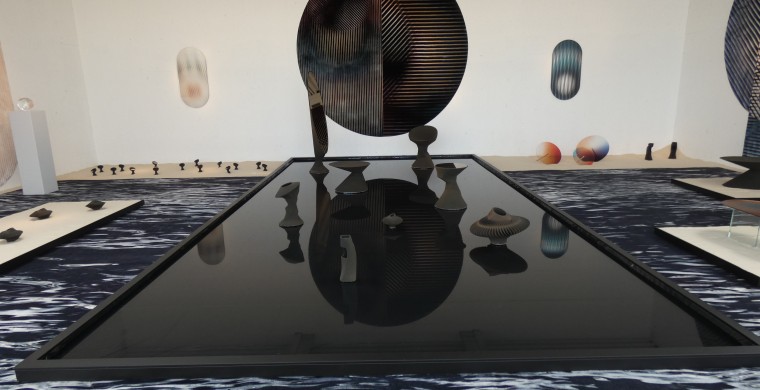By Paula Rook for FlyingWineWriter
Dutch Design Week was held in Eindhoven between 19 and 27 October. The largest design event in Northern Europe presents the work and concepts of 2600 designers to 350,000 visitors in total. This year’s theme is: ” If not now, then when?”
I am looking for ideas in the field of: 1. biodiversity, 2. circular economy, 3. climate and 4. sustainability.
Biodiversity: I have found a project with an invasive plant in North Brabant. The plant produces red berries that has been harvested to make juice. The use of pesticides is not environmentally friendly and cutting them into small pieces helps spread the plant.
Circular economy: A number of projects use recycling material to manufacture a sofa, a bed or a wardrobe. They use plastic, wood, metal and organic materials. Furthermore, I have found a project in which organic material is used to produce a thin layer that can be used instead of plastic. For example, one uses plastic to decorate flower bouquets, the thin layer can be used instead.
Climate: There was an exhibition in the Van Abbemuseum : ‘All that is solid melts into trash ‘. With images and sound, they show how a design can play a role in the past, present and future of waste. For example, a microwave has silica as part of the design, but silica is hardly re-used. Furthermore, everyone knows The Great Pacific Garbage Patch. Because microorganisms live in plastic mass, scientists call it Plastisphere . The microorganisms eat and live in the waste from our sea.
Sustainability: The most important thing now is to create a green city. People want to build sustainably and produce food in the city. To achieve the goal, they will grow plants in special spaces in the city. There will be more green areas in landscape design. Furthermore, there is attention for the use of bio materials to manufacture furniture and electrical energy as a source for transport designs such as a car, a bus or a scooter.
My conclusion is that during Dutch Design Week you could see how the world market has changed to produce as little waste as possible. It is more about national projects in which a circular economy has to be implemented and food is produced with respect for biodiversity and the environment.
Wine is also food, so the country of origin is responsible for their own biodiversity and environment. Those who buy their wine can make demands on wine producers, so everyone helps. Which requirements could be very effective? I think of:
An individual study on the impact of the wine company on biodiversity and the environment in the country. We call financial support for national or regional agricultural projects for biodiversity instead of just their own small production.
Less attention to organic and vegan certification that has no national impact, instead certified as a group for food production in the region. Once the entire chain has achieved its goals, then only certify.
The use of technology towards CO2 neutral is important and it cannot be a luxury. It could start a regional or national project, as long as everyone benefits from such technology.
In the Netherlands, agriculture is responsible for 86% of ammonia emissions, according to the National Institute for Public Health and the Environment in 2016. Measures that could help to reduce emissions lead to protests in October 2019. In my opinion, this measures are causing more damage than solutions.
Ultimately, the country of consumption is responsible for recycling and circular economy. It is clearly a social responsibility. Why is there no sense of cooperation in the wine-producing country? We have the image of a family business that only fights in a collapsed market as if wine production cannot help the rest of the country. Now I understand the slogan of Dutch Design Week: If not now, then when?
Send comments to Paula Rook: Agricultural engineer with 12 years of work experience in wine production as a wine specialist and in the wine trade as a communication specialist for FlyingWineWriter.com 10 years an international communication platform for sustainability, biodiversity and innovation in agriculture and viticulture and Wijnplein.nl has been the platform for wine and gastronomy in the Netherlands and Belgium for 22 years. You benefit from exclusive information for professionals in the wine trade, as well as a vision on international developments and strategies.
Contact: paula@wijnplein.nl or paula@flyingwinewriter.com




